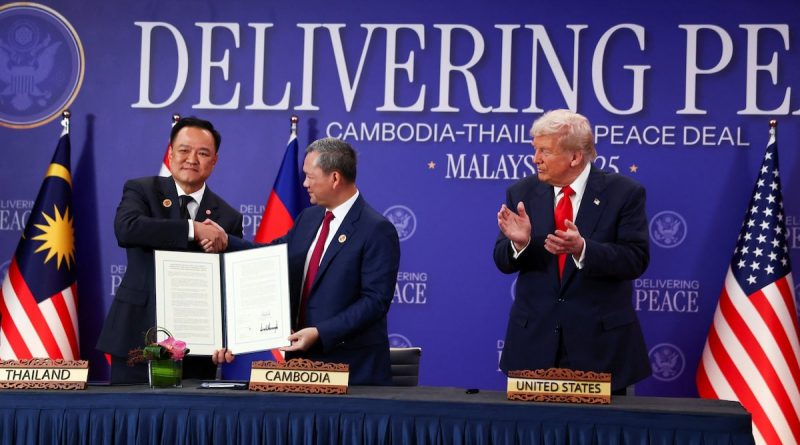Thailand and Cambodia Sign Historic Peace Pact to Strengthen Regional Stability and Prosperity
Kuala Lumpur – In a landmark diplomatic breakthrough, Thailand and Cambodia have officially signed an expanded ceasefire agreement, marking a major step toward lasting peace and cooperation between the two Southeast Asian neighbors.
The historic signing ceremony took place on Sunday on the sidelines of the 47th Association of Southeast Asian Nations (ASEAN) Summit in Kuala Lumpur, in the presence of U.S. President Donald Trump, whose mediation efforts earlier this year were instrumental in de-escalating tensions following the border clashes.
The agreement represents a renewed commitment to peace, security, and mutual understanding between Bangkok and Phnom Penh after years of sporadic disputes.
Both Thai Prime Minister Anutin Charnvirakul and Cambodian Prime Minister Hun Manet expressed optimism about this new chapter, highlighting that the deal reflects their shared vision of transforming the border from a zone of conflict into one of cooperation and shared prosperity.
The ceasefire comes after several months of diplomatic negotiations and confidence-building measures initiated following a deadly five-day border conflict in mid-2025.
The two nations agreed to enhance dialogue mechanisms, promote joint border patrols, and expand communication channels to prevent future misunderstandings.
Leaders from both sides reaffirmed their commitment to respecting sovereignty, strengthening security cooperation, and fostering economic integration along their shared borders.
Observers have hailed the deal as a symbol of ASEAN’s enduring role in fostering peace and stability in the region. The agreement underscores the bloc’s emphasis on diplomacy and collective problem-solving, promoting regional unity and cooperation in addressing common challenges.
Analysts note that this ceasefire could serve as a model for other regional conflicts, emphasizing the importance of dialogue, mutual respect, and international support in resolving disputes peacefully.
In his remarks, U.S. President Donald Trump commended both leaders for their statesmanship and willingness to prioritize peace over conflict.
He described the accord as “a shining example of how determination and dialogue can overcome even the most deep-rooted differences.”
His administration had played a key role in facilitating discussions earlier in the year, with U.S. diplomats working alongside ASEAN representatives to help both nations reach a viable solution.
Prime Minister Anutin Charnvirakul of Thailand emphasized that the new agreement is not only about halting military activities but also about laying the foundation for sustainable cooperation.
He noted that both countries would focus on rebuilding trust through joint infrastructure projects, trade partnerships, and cross-border cultural initiatives that could benefit citizens on both sides.
“This is the beginning of a new era,” Anutin said, expressing confidence that Thailand and Cambodia could transform their shared borders into a gateway of opportunity and development.
Cambodian Prime Minister Hun Manet echoed similar sentiments, saying that the agreement reflects his nation’s commitment to peace, progress, and regional solidarity.
He praised the collaborative spirit of the negotiations and extended gratitude to ASEAN members and the international community for their support. “Peace is not only the absence of war but the presence of cooperation and goodwill,” he remarked.
Under the agreement, both countries have pledged to set up a bilateral peace commission that will monitor implementation and ensure that military and civilian agencies adhere to the terms.
The commission will also oversee future joint development projects in trade, tourism, and agriculture, aimed at revitalizing border communities affected by years of instability.
The deal is expected to have a positive ripple effect throughout Southeast Asia, reinforcing the importance of diplomacy and dialogue in maintaining regional peace.
With both Thailand and Cambodia being key ASEAN members, their cooperation is likely to boost investor confidence and encourage greater collaboration in regional economic initiatives such as the ASEAN Free Trade Area and cross-border connectivity projects.
As the ASEAN Summit continues, leaders from across the region have welcomed the development as a beacon of hope for conflict resolution and peaceful coexistence.
The signing of the Thailand-Cambodia peace agreement is not just a bilateral achievement but also a reaffirmation of ASEAN’s core principles of unity, peace, and mutual respect.
The ceremony concluded with applause and optimism, symbolizing a new dawn of friendship between Thailand and Cambodia.
The agreement marks not only the end of a long-standing dispute but also the beginning of a cooperative partnership built on trust, dialogue, and shared prosperity.



